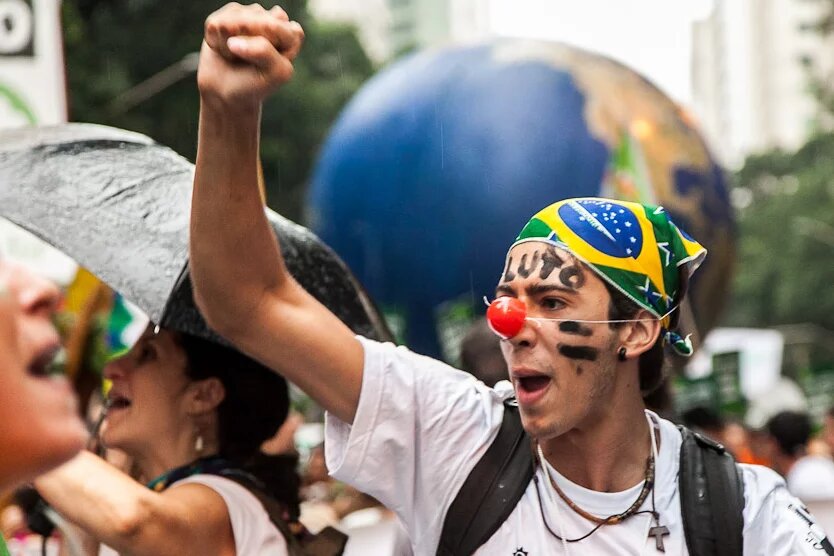
Even within the Heinrich Böll Foundation, the various concepts of a sustainable, environmentally friendly and participatory economy are the subject of intense debate. A introduction on the background of this book by the foundations presidents Barbara Unmüßig and Ralf Fücks.
Rio de Janeiro 2012: tens of thousands of people take to the streets in protest against what they perceive to be a misleading concept of “Green Economy”. It was not the oil, coal or agribusiness corporations which had rallied the demonstrators, but social movements and NGOs, predominantly from the Global South and including a number of the Heinrich Böll Foundation’s partner organisations. The occasion was the United Nations Conference on Sustainable Development (Rio+20), an event which, 20 years after the 1992 Earth Summit, was set to establish “Green Economy” as a new global paradigm. These protests against the vision of a Green Economy provoked a divided response. Shouldn’t we be directing all our efforts towards overcoming the “brown”, fossil-fuel economy? Isn’t Green Economy exactly what the environmental movement has been demanding for decades? Indeed. But the critical question is what it means, and how the concept of a Green Economy is spelt out in reality. Not everything that sails under a green flag is worthy of the name.
The criticism of truncated and misleading notions of the Green Economy does not dismiss the hope of a sustainable future and a “greening” of the economy; rather, it addresses those concepts defined by key players like the World Bank, the OECD and business-based think tanks, which currently frame most people’s understanding of Green Economy.
Major topic on the Heinrich Böll Foundation’s agenda
Whether we like it or not, it is a contentious issue. Yet for all the disputes, the discourse does take up the pivotal question confronting us today: faced with so many crises requiring urgent attention, can we accomplish a fundamental transformation of the economy and society towards sustainability?
Along with democracy and human rights, this is the major topic on the Heinrich Böll Foundation’s agenda. We facilitate this transformation in diverse ways – with workable scenarios for a successful energy transition, for agricultural policy reform, for alternative mobility and for sustainable urban development. We do not shy away from dialogue with industry. We devote the majority of our resources to critically appraising the fossil-fuel economy and agroindustry. At the same time, we support many stakeholders worldwide who are striving for different modes of production and lifestyles and are trying out new ideas of social coexistence. Advancing the necessary “major transformation” requires both approaches: visionary alternatives and incremental changes.
We see ourselves as a catalysing force as well as a think tank, and that means engaging with the various strategies and discourses that aim to contribute to social and environmental transformation. A departure from “business as usual” has been politically tenable for some time. But the question of how the transformation is to be effected is a matter of dispute. How is this transformation defined? Which tools and mechanisms are required? What promises does it make? It will come as no surprise to anyone that such questions arouse controversy.
Even within the Heinrich Böll Foundation, the various concepts of a sustainable, environmentally friendly and participatory economy are the subject of intense debate. The spectrum ranges from blueprints for a green industrial revolution to the critique of mainstream concepts of a Green Economy that claim to accomplish the transformation purely by means of technological innovation and more market influence, holding out the promise that all will be well. But is the expansion of market mechanisms really appropriate for halting climate change and environmental degradation? How much and which type of political regulation is needed to promote the kind of structural change that will be necessary to move towards a sustainable and just economy? These are just some of the questions explored in this volume.
A critical assessment of mainstream concepts of a Green Economy
Although it is correct that “prices should tell the environmental truth”, we are critical of the general financialisation of nature (and of society). Likewise, the relationship between innovation and limitation, efficiency and sufficiency requires critical examination. Ultimately, it is about the key role of politics in the process of environmental transformation.
This book is therefore devoted primarily to a critical assessment of mainstream concepts of a Green Economy. The authors shed light on aspects that tend to go unnoticed in this context – questions of human rights, participation and democracy, for instance. In addition, they discuss the role of politics in a world in which all challenges are increasingly defined in terms of economic imperatives.
To that extent, this publication itself is part of the controversy. The views expressed by the authors are their own. Within the Foundation we discuss ways out of the environmental and social crisis with great passion. In so doing, we articulate diverse views and ideas about which instruments, what balance of market and state, how much growth and which innovations and alliances will move us forward. This book sets out to generate creative tension. Quite intentionally, it does not set forth any major counterproposal to the conventional definition of Green Economy. Rather, our aim is to encourage a process of reappraisal and reflection. In that spirit, we look forward to engaging in the debate on a just and sustainable future within our global partner network.
Every campaign needs champions. While thinking about, discussing and writing this book, the authors have greatly benefited from others’ advice, ideas and encouragement. We would particularly like to thank Christine Chemnitz, Ulrich Hoffmann, Heike Löschmann, Ulrich Brand, Jutta Kill and Wolfgang Sachs for their time and dedication in commenting on the manuscript. We also wish to express our gratitude to Bernd Rheinberg for his professional advice and his great patience.
Barbara Unmüßig and Ralf Fücks
Presidents of the Heinrich Böll Foundation
Berlin, April 2016